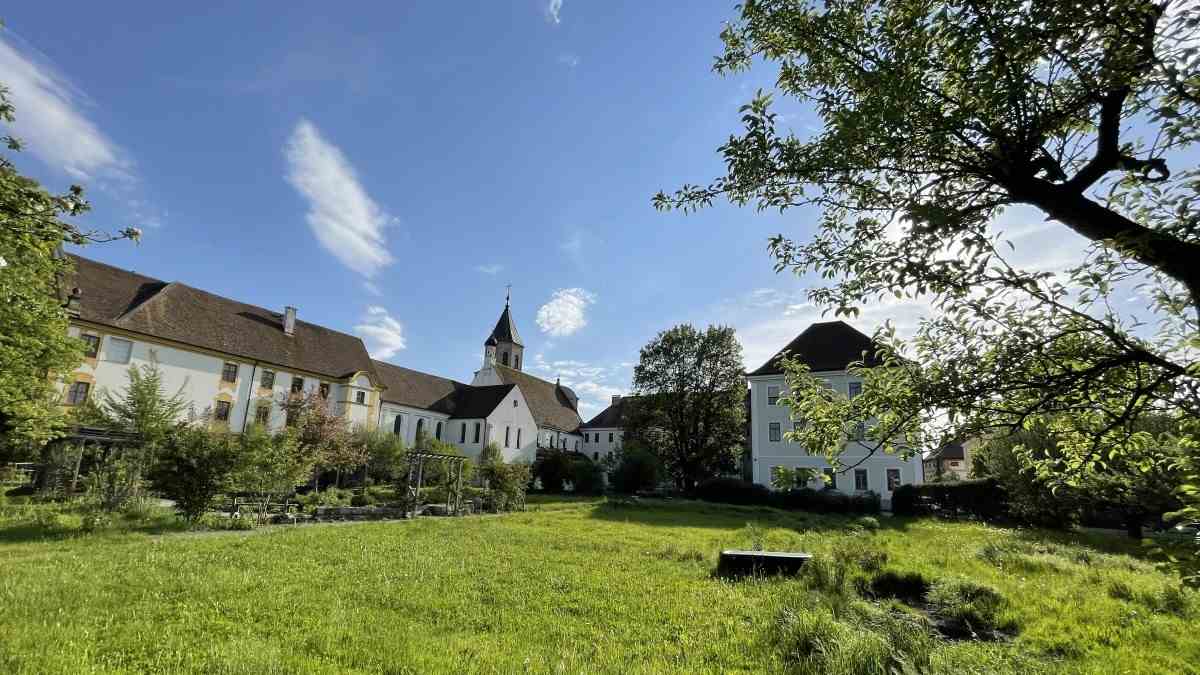Three nuns still live in the Polling convent near the Upper Bavarian district town of Weilheim, and anyone who would claim that they are no longer the very youngest would not offend them. Hardly any young sisters will follow from the Dominican convent in the Swabian town of Donauwörth, to which Polling belongs as a branch convent, because there are only four of them there. However, Prioress Teresa Westermeier has recently been to Polling more often, because the Dominicans have big plans, and they need space for them: A new extension is to close the listed monastery complex back almost to the square that it has been for a long time in its more than 1200-year history is.
This construction project, which the prioress calls “an enormous feat”, will serve to expand the hospice that has been based in the monastery for 20 years, and a second hospice will also be built under the same roof. Polling Abbey will then also offer seriously ill children and their families a place where they can find peace and regain their strength.
Many people see this monastery as a “place of power”, and this word is used again and again when people talk about it. Prioress Teresa Westermeier uses it, as does Polling’s mayor Martin Pape and Bishop Bertram Meier of Augsburg, to whose diocese Polling belongs. “So not just downsizing our monasteries, not orderly withdrawal,” says Meier about the hospice project. The sisters had “literally sold their silverware” in the form of a monastery property in order to help other people “in a crucial phase of life, the transition from life to death”.
This has been happening in Polling since 2002, when the “Hospizverein im Pfaffenwinkel” started providing inpatient terminal care here. Ten years earlier, the Missionary Benedictine nun Angela Kirchensteiner had set up an outpatient hospice service in Bernried. Kirchensteiner is still a driving force at the hospice association, as is its chair, former CSU member of parliament Renate Dodell. For Dodell, too, the monastery is a declared place of power, and she shares this feeling with Christine Bronner from the Stiftung ambulantes Kinderhospiz München (AKM).
There will be eight places for young people in Polling
This AKM, founded by Bronner and her husband in 2004 as a hospice service and in 2005 as a foundation, now accompanies more than 700 children, young people and families from all over Bavaria every year and maintains bases in Inning am Ammersee, in Landshut and in Rosenheim. In Polling there will now be a semi-stationary offer with eight places, the young people should be able to breathe deeply here and not only be cared for, but also pedagogically encouraged.
For four years, the foundation and the association have been working on their idea of accommodating two hospices in an annex to the monastery. Because the ten rooms of the current hospice, in which more than 1900 people have died so far, are no longer sufficient to be able to accommodate all guests at the right time, and after 20 years they no longer meet the latest requirements. They should therefore only be used as ancillary rooms when there will be 14 and later maybe 16 new rooms for adult guests in the new building in a few years.
There are still three Dominican nuns in the Polling convent. Sister Gabriela has been living here for more than 50 years.
(Photo: Matthias Köpf)
But there are still only approximate plans for the extension, which are based on the dimensions and the roof pitch of the existing monastery building and the floor plan roughly on a cadastral plan from 1810, which shows a closed monastery quadrangle. The new building is to be built where the monastery garden now merges into a large orchard. However, he will have to keep some distance to the other wing of the building, which has been privately owned since Polling Monastery was also secularized in 1803.
The monastery was founded around the year 750 by Benedictines
It was founded by the Benedictines around the year 750, later Augustinian canons lived in Polling. The Dominicans only took over parts of the old monastery in 1892 and ran a school there until 1972. “A simple, functional extension” is what they, the hospice association, its planners and the St. Ulrichswerk of the diocese of Augsburg, which will oversee the construction, have in mind for the two hospices. The preservationists were open to discussion, says Renate Dodell, even when it came to photovoltaics on the roof, they would have dismissed it immediately and in principle.
Apart from more detailed plans and permits, the project still lacks money. The Ulrichswerk calculates with 17.5 million euros, but in view of rising prices, the plans will have to be slimmed down again so that it can remain at this sum. The diocese raises four and a half million euros, six million euros are to come from loans, the two hospice providers want to raise four million in the form of donations and have just founded a joint association for this purpose. Three million come from the monastery. Because the sisters are investing in a future without themselves.

